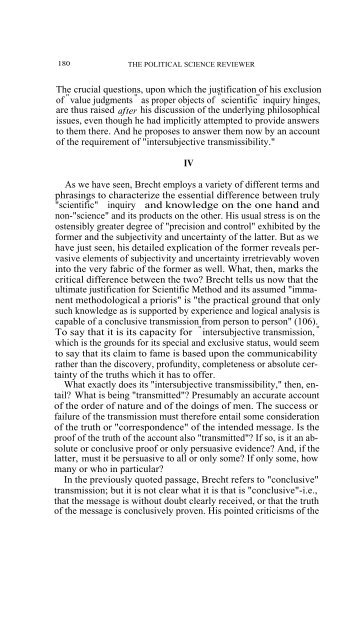ARNOLD BRECHT'S POLITICAL THEORY REVISITED Political ...
ARNOLD BRECHT'S POLITICAL THEORY REVISITED Political ...
ARNOLD BRECHT'S POLITICAL THEORY REVISITED Political ...
Create successful ePaper yourself
Turn your PDF publications into a flip-book with our unique Google optimized e-Paper software.
180 THE <strong>POLITICAL</strong> SCIENCE REVIEWER<br />
The crucial questions, upon which the justification of his exclusion<br />
of " value judgments " as proper objects of " scientific " inquiry hinges,<br />
are thus raised after his discussion of the underlying philosophical<br />
issues, even though he had implicitly attempted to provide answers<br />
to them there. And he proposes to answer them now by an account<br />
of the requirement of "intersubjective transmissibility."<br />
IV<br />
As we have seen, Brecht employs a variety of different terms and<br />
phrasings to characterize the essential difference between truly<br />
"scientific" inquiry and knowledge on the one hand and<br />
non-"science" and its products on the other. His usual stress is on the<br />
ostensibly greater degree of "precision and control" exhibited by the<br />
former and the subjectivity and uncertainty of the latter. But as we<br />
have just seen, his detailed explication of the former reveals pervasive<br />
elements of subjectivity and uncertainty irretrievably woven<br />
into the very fabric of the former as well. What, then, marks the<br />
critical difference between the two? Brecht tells us now that the<br />
ultimate justification for Scientific Method and its assumed "immanent<br />
methodological a prioris" is "the practical ground that only<br />
such knowledge as is supported by experience and logical analysis is<br />
capable of a conclusive transmission from person to person" (106).<br />
To say that it is its capacity for " intersubjective transmission, "<br />
which is the grounds for its special and exclusive status, would seem<br />
to say that its claim to fame is based upon the communicability<br />
rather than the discovery, profundity, completeness or absolute certainty<br />
of the truths which it has to offer.<br />
What exactly does its "intersubjective transmissibility," then, entail?<br />
What is being "transmitted"? Presumably an accurate account<br />
of the order of nature and of the doings of men. The success or<br />
failure of the transmission must therefore entail some consideration<br />
of the truth or "correspondence" of the intended message. Is the<br />
proof of the truth of the account also "transmitted"? If so, is it an absolute<br />
or conclusive proof or only persuasive evidence? And, if the<br />
latter, must it be persuasive to all or only some? If only some, how<br />
many or who in particular?<br />
In the previously quoted passage, Brecht refers to "conclusive"<br />
transmission; but it is not clear what it is that is "conclusive"-i.e.,<br />
that the message is without doubt clearly received, or that the truth<br />
of the message is conclusively proven. His pointed criticisms of the
















